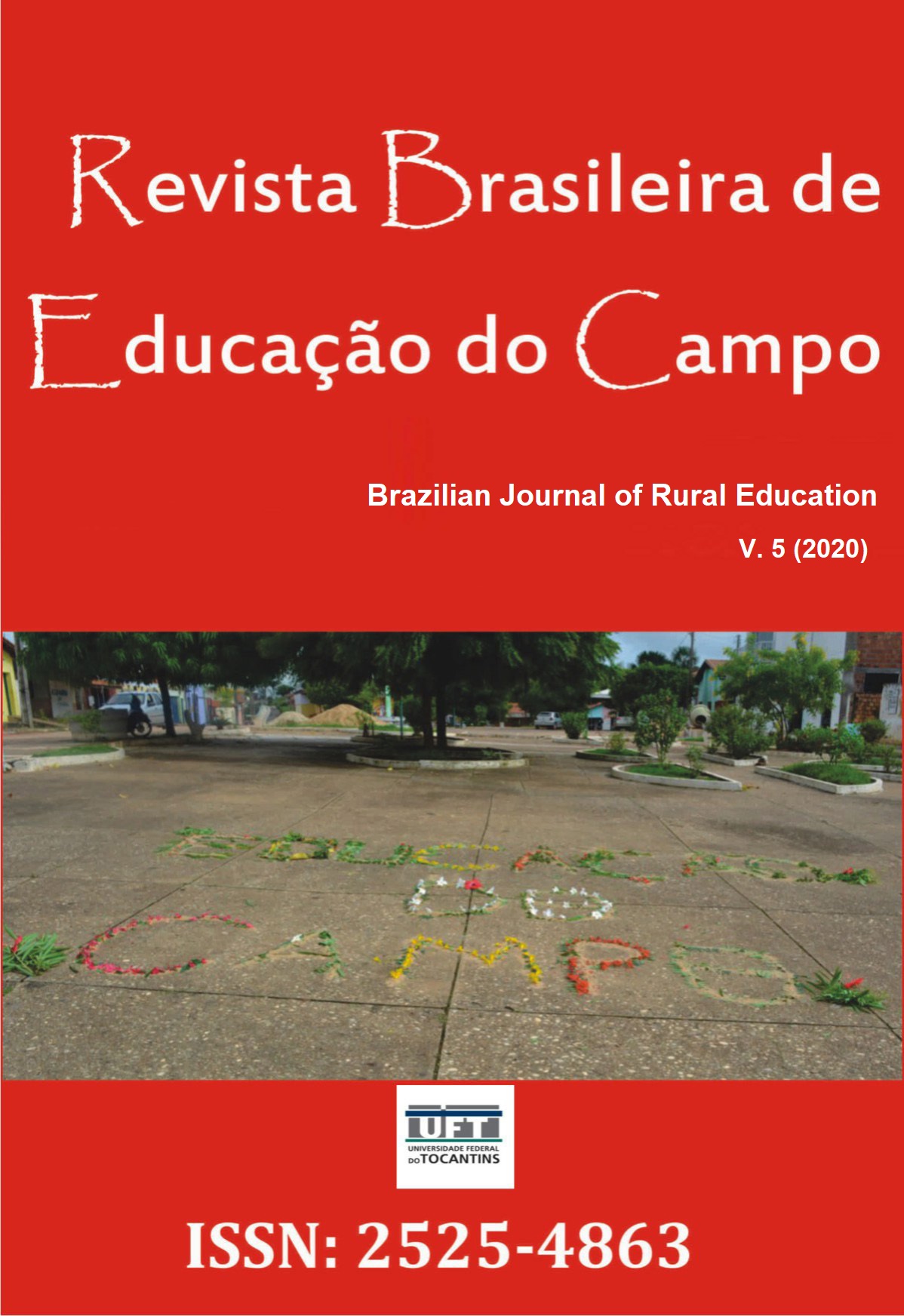Degree in Mathematics from the University of the State of Pará - UEPA and training for teaching work in the rural context of Conceição do Araguaia – PA
DOI:
https://doi.org/10.20873/uft.rbec.e9000Schlagworte:
Politisch-pädagogisches Projekt, Abschluss in Mathematik, ländlicher KontextAbstract
Zusammenfassung Mit diesem Artikel soll überprüft werden, welche Aspekte der Unterrichtspraxis im ländlichen Kontext im Projekt des Pädagogischen Kurses (PPC) des Abschlusses in Mathematik an der Staatlichen Universität von Pará - UEPA enthalten sind. Zu diesem Zweck wurde eine deskriptive und dokumentarische Untersuchung mit einem qualitativen Ansatz entwickelt, der auf der Analyse der Geschichte des Rechtssystems basiert, die in der Stellungnahme des Nationalen Bildungsrates CNE / CEB 36/2001 zu den Überlegungen von Borges (2012) zu enthalten ist die Schule und die Unterrichtspraxis im ländlichen Kontext und im Vorschlag von D'Ambrósios Programm für Ethnomathematik (2019) als methodische Ressource zur Verfeinerung des Mathematikunterrichts im ländlichen Kontext. Die Ergebnisse zeigen, dass die PPC des Abschlusses in Mathematik, UEPA, mit einem Vorschlag zur Lehrerausbildung arbeitet, der die Fähigkeit zur intellektuellen Autonomie besitzt und die soziokulturelle Realität der Region kennt, die aus einem Teil besteht, der als ländliche Siedlung betrachtet wird. Die Ergebnisse zeigen, dass der Kurs zwar nicht speziell für die ländliche Bildung gedacht ist, es jedoch Disziplinen gibt, in denen der Lehrer die Realität und die Herausforderungen der Bildung für die ländliche Bevölkerung hinterfragen und diskutieren kann.
Downloads
Literaturhinweise
Borges, H. S., & Silva, H. B. (2012). Educação do Campo e a Organização do Trabalho Pedagógico. In Ghedin, E. (Org.). Educação do Campo: Epistemologia e Práticas (pp. 206-235). São Paulo, SP Cortez.
Borges, H. S. (2012). Educação do Campo como processo de luta por uma sociedade justa. In Ghedin, E. (Org.). Educação do Campo: Epistemologia e práticas (pp. 76-116). São Paulo, SP: Cortez.
Caldart, R. S. (2012). Educação do Campo. In Caldart, R. S. (Org.). Dicionário da Educação do Campo (pp. 257-267). São Paulo, SP: Escola Politécnica de Saúde Joaquim Venâncio, Expressão Popular.
Ribeiro, M. (2012). Educação Rural. In Caldart, R. S. (Org.). Dicionário da Educação do Campo (293-301). São Paulo, SP: Escola Politécnica de Saúde Joaquim Venâncio, Expressão Popular.
D’Ambrosio, U. (1996). Educação Matemática: da teoria a prática. Campinas, SP: Papirus.
Ferreira, L. (2017) A Compreensão Histórica e Folclórica Pela Cartografia Social: um estudo de caso do município de Conceição do Araguaia – Pará. RETTA- Revista de Educação Técnica e Tecnológica em Ciências Agrícolas, 8(15), 146-165.
Fiorentini, D. (2016, 30 março). Diálogos com Educadores. Espaço Pedagógico, 20(1), 217-227.
Ghedin, E. (2012). Perspectivas Sobre a Identidade do Educador do Campo. In Ghedin, E. (Org.). Educação do Campo: Epistemologia e Práticas (pp. 25-62). São Paulo, SP: Cortez.
Instituto Brasileiro de Geografia e Estatística. (2020). Censo Demográfico 2010. Pará: IBGE, Recuperado de https://cidades.ibge.gov.br/brasil/pa/conceicao-do-araguaia/panorama
Lei n. 9.394 de 20 de dezembro de 1996. (1996, 20 de dezembro). Estabelece as Diretrizes e Bases da Educação Nacional. Recuperado de: http://www.planalto.gov.br/ccivil_03/leis/l9394.htm
Parecer CNE/CEB nº 36 de 4 de dezembro de 2001 (2001, 4 de dezembro). Diretrizes Operacionais para a Educação Básica nas Escolas do Campo Parecer CEB nº 36/2001, 04 de dezembro de 2001.
Universidade do Estado do Pará. (2012). Projeto Pedagógico do Curso de Licenciatura em Matemática. Belém, PA: UEPA.
Universidade do Estado do Pará. (2017). Plano de Desenvolvimento Institucional 2017-2027. Belém, PA: UEPA.
Veröffentlicht
Zitationsvorschlag
Ausgabe
Rubrik
Lizenz
Creative Commons Attribution License
Creative Commons Attribution License
Proposal for Copyright Notice Creative Commons
1. Policy Proposal to Open Access Journals
Authors who publish with this journal agree to the following terms:
A. Authors retain copyright and grant the journal right of first publication with the work simultaneously licensed under the Creative Commons Attribution License that allows sharing the work with recognition of its initial publication in this journal.
B. Authors are able to take on additional contracts separately, non-exclusive distribution of the version of the paper published in this journal (ex .: publish in institutional repository or as a book), with an acknowledgment of its initial publication in this journal.
C. Authors are permitted and encouraged to post their work online (eg .: in institutional repositories or on their website) at any point before or during the editorial process, as it can lead to productive exchanges, as well as increase the impact and the citation of published work (See the Effect of Open Access).














